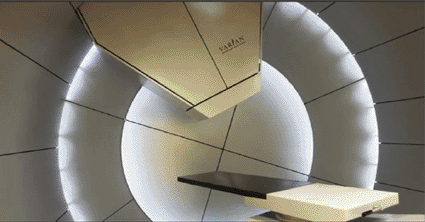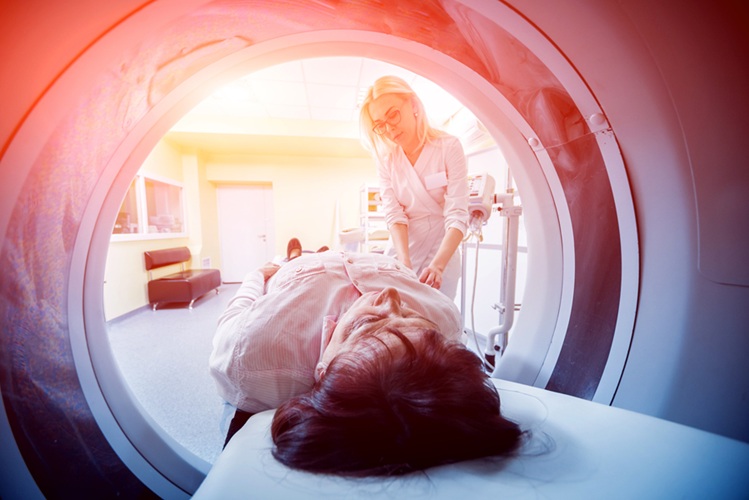Proton Beam Therapy System Enhances Treatment Quality
|
By MedImaging International staff writers Posted on 30 Jan 2011 |

Image: The Varian ProBeam proton therapy system (photo courtesy Varian Medical Systems).
An innovative treatment system delivers precise intensity modulated proton therapy (IMPT), using pencil beam scanning technology.
The Varian ProBeam proton therapy system generates protons for precision radiotherapy of lesions, tumors, and any other conditions in which radiation treatment is indicated. The IMPT delivers protons that stop at specified depths within the anatomy, thereby reducing exposure of healthy tissue. Scanning beam technology enables IMPT by modulating dose levels on a spot-by-spot basis throughout the treatment area; irradiations from multiple angles are combined in an optimal manner to improve control of dose distributions. The scanning beam technology also eliminates the time-consuming need to insert separate shaping accessories manually for each beam angle in order to match the beam to the shape of the tumor.
The ProBeam system incorporates dynamic peak integrated scanning technology, which paints a precise radiation dose on the target volume, enabling true IMPT. The system utilizes a 250 MeV super-conducting cyclotron, and includes a streamlined treatment console with a modern, graphical, easy-to-use interface that consolidates all controls for imaging, treatment, and motion management. Treatment process and workflows are simplified and easy to learn, with a "follow the light” guidance system that is designed to enhance usability and promote safety by guiding therapists through the steps of even the most complex treatments. The ProBeam IMPT system was developed by Varian Medical Systems (Varian, Palo Alto, CA, USA), and has been approved by the US Food and Drug Administration (FDA).
"ProBeam is the result of decades of leadership in proton therapy research and development and it has been designed from the ground-up to meet the needs of clinicians and patients alike,” said Moataz Karmalawy, PhD, head of Varian's particle therapy group. "This fully integrated system can be used for all forms of advanced proton therapy, including image-guided proton therapy and intensity-modulated proton therapy.”
Due to their relatively large mass, protons have little lateral side scatter in the tissue; the beam does not broaden much, stays focused on the tumor shape and delivers small dose side effects to surrounding tissue. Protons are generated by accelerators in the range of 70 MeV to 250 MeV; by adjusting the energy of the protons during application of treatment, the cell damage due to the proton beam is maximized within the tumor itself. Tissues closer to the surface of the body than the tumor receive reduced radiation, and therefore, reduced damage; tissues deeper within the body receive very few protons, so that the dosage becomes immeasurably small.
Related Links:
Varian Medical Systems
The Varian ProBeam proton therapy system generates protons for precision radiotherapy of lesions, tumors, and any other conditions in which radiation treatment is indicated. The IMPT delivers protons that stop at specified depths within the anatomy, thereby reducing exposure of healthy tissue. Scanning beam technology enables IMPT by modulating dose levels on a spot-by-spot basis throughout the treatment area; irradiations from multiple angles are combined in an optimal manner to improve control of dose distributions. The scanning beam technology also eliminates the time-consuming need to insert separate shaping accessories manually for each beam angle in order to match the beam to the shape of the tumor.
The ProBeam system incorporates dynamic peak integrated scanning technology, which paints a precise radiation dose on the target volume, enabling true IMPT. The system utilizes a 250 MeV super-conducting cyclotron, and includes a streamlined treatment console with a modern, graphical, easy-to-use interface that consolidates all controls for imaging, treatment, and motion management. Treatment process and workflows are simplified and easy to learn, with a "follow the light” guidance system that is designed to enhance usability and promote safety by guiding therapists through the steps of even the most complex treatments. The ProBeam IMPT system was developed by Varian Medical Systems (Varian, Palo Alto, CA, USA), and has been approved by the US Food and Drug Administration (FDA).
"ProBeam is the result of decades of leadership in proton therapy research and development and it has been designed from the ground-up to meet the needs of clinicians and patients alike,” said Moataz Karmalawy, PhD, head of Varian's particle therapy group. "This fully integrated system can be used for all forms of advanced proton therapy, including image-guided proton therapy and intensity-modulated proton therapy.”
Due to their relatively large mass, protons have little lateral side scatter in the tissue; the beam does not broaden much, stays focused on the tumor shape and delivers small dose side effects to surrounding tissue. Protons are generated by accelerators in the range of 70 MeV to 250 MeV; by adjusting the energy of the protons during application of treatment, the cell damage due to the proton beam is maximized within the tumor itself. Tissues closer to the surface of the body than the tumor receive reduced radiation, and therefore, reduced damage; tissues deeper within the body receive very few protons, so that the dosage becomes immeasurably small.
Related Links:
Varian Medical Systems
Latest Nuclear Medicine News
- Novel Radiolabeled Antibody Improves Diagnosis and Treatment of Solid Tumors
- Novel PET Imaging Approach Offers Never-Before-Seen View of Neuroinflammation
- Novel Radiotracer Identifies Biomarker for Triple-Negative Breast Cancer
- Innovative PET Imaging Technique to Help Diagnose Neurodegeneration
- New Molecular Imaging Test to Improve Lung Cancer Diagnosis
- Novel PET Technique Visualizes Spinal Cord Injuries to Predict Recovery
- Next-Gen Tau Radiotracers Outperform FDA-Approved Imaging Agents in Detecting Alzheimer’s
- Breakthrough Method Detects Inflammation in Body Using PET Imaging
- Advanced Imaging Reveals Hidden Metastases in High-Risk Prostate Cancer Patients
- Combining Advanced Imaging Technologies Offers Breakthrough in Glioblastoma Treatment
- New Molecular Imaging Agent Accurately Identifies Crucial Cancer Biomarker
- New Scans Light Up Aggressive Tumors for Better Treatment
- AI Stroke Brain Scan Readings Twice as Accurate as Current Method
- AI Analysis of PET/CT Images Predicts Side Effects of Immunotherapy in Lung Cancer
- New Imaging Agent to Drive Step-Change for Brain Cancer Imaging
- Portable PET Scanner to Detect Earliest Stages of Alzheimer’s Disease
Channels
Radiography
view channel
AI Improves Early Detection of Interval Breast Cancers
Interval breast cancers, which occur between routine screenings, are easier to treat when detected earlier. Early detection can reduce the need for aggressive treatments and improve the chances of better outcomes.... Read more
World's Largest Class Single Crystal Diamond Radiation Detector Opens New Possibilities for Diagnostic Imaging
Diamonds possess ideal physical properties for radiation detection, such as exceptional thermal and chemical stability along with a quick response time. Made of carbon with an atomic number of six, diamonds... Read moreMRI
view channel
Cutting-Edge MRI Technology to Revolutionize Diagnosis of Common Heart Problem
Aortic stenosis is a common and potentially life-threatening heart condition. It occurs when the aortic valve, which regulates blood flow from the heart to the rest of the body, becomes stiff and narrow.... Read more
New MRI Technique Reveals True Heart Age to Prevent Attacks and Strokes
Heart disease remains one of the leading causes of death worldwide. Individuals with conditions such as diabetes or obesity often experience accelerated aging of their hearts, sometimes by decades.... Read more
AI Tool Predicts Relapse of Pediatric Brain Cancer from Brain MRI Scans
Many pediatric gliomas are treatable with surgery alone, but relapses can be catastrophic. Predicting which patients are at risk for recurrence remains challenging, leading to frequent follow-ups with... Read more
AI Tool Tracks Effectiveness of Multiple Sclerosis Treatments Using Brain MRI Scans
Multiple sclerosis (MS) is a condition in which the immune system attacks the brain and spinal cord, leading to impairments in movement, sensation, and cognition. Magnetic Resonance Imaging (MRI) markers... Read moreUltrasound
view channel.jpeg)
AI-Powered Lung Ultrasound Outperforms Human Experts in Tuberculosis Diagnosis
Despite global declines in tuberculosis (TB) rates in previous years, the incidence of TB rose by 4.6% from 2020 to 2023. Early screening and rapid diagnosis are essential elements of the World Health... Read more
AI Identifies Heart Valve Disease from Common Imaging Test
Tricuspid regurgitation is a condition where the heart's tricuspid valve does not close completely during contraction, leading to backward blood flow, which can result in heart failure. A new artificial... Read moreGeneral/Advanced Imaging
view channel
AI-Based CT Scan Analysis Predicts Early-Stage Kidney Damage Due to Cancer Treatments
Radioligand therapy, a form of targeted nuclear medicine, has recently gained attention for its potential in treating specific types of tumors. However, one of the potential side effects of this therapy... Read more
CT-Based Deep Learning-Driven Tool to Enhance Liver Cancer Diagnosis
Medical imaging, such as computed tomography (CT) scans, plays a crucial role in oncology, offering essential data for cancer detection, treatment planning, and monitoring of response to therapies.... Read moreImaging IT
view channel
New Google Cloud Medical Imaging Suite Makes Imaging Healthcare Data More Accessible
Medical imaging is a critical tool used to diagnose patients, and there are billions of medical images scanned globally each year. Imaging data accounts for about 90% of all healthcare data1 and, until... Read more
Global AI in Medical Diagnostics Market to Be Driven by Demand for Image Recognition in Radiology
The global artificial intelligence (AI) in medical diagnostics market is expanding with early disease detection being one of its key applications and image recognition becoming a compelling consumer proposition... Read moreIndustry News
view channel
GE HealthCare and NVIDIA Collaboration to Reimagine Diagnostic Imaging
GE HealthCare (Chicago, IL, USA) has entered into a collaboration with NVIDIA (Santa Clara, CA, USA), expanding the existing relationship between the two companies to focus on pioneering innovation in... Read more
Patient-Specific 3D-Printed Phantoms Transform CT Imaging
New research has highlighted how anatomically precise, patient-specific 3D-printed phantoms are proving to be scalable, cost-effective, and efficient tools in the development of new CT scan algorithms... Read more
Siemens and Sectra Collaborate on Enhancing Radiology Workflows
Siemens Healthineers (Forchheim, Germany) and Sectra (Linköping, Sweden) have entered into a collaboration aimed at enhancing radiologists' diagnostic capabilities and, in turn, improving patient care... Read more



















